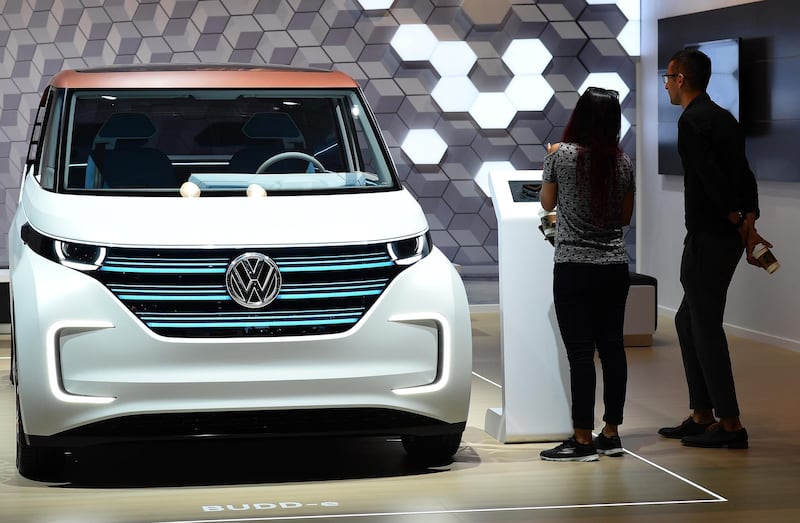Volkswagen will invest more than €10 billion (Dh45.25bn) with its partners to make and develop a range of new-energy vehicles in China as car makers step up investments in low-emission models in the world’s biggest auto market.
Volkswagen will make the investments by 2025 and introduce 40 locally produced vehicles, its China head Jochem Heizmann said in Guangzhou Thursday. The European car maker’s venture with Anhui Jianghuai Automobile Group will start production of electric vehicles in the first half of next year, while sales will start in the second half.
The German manufacturer joins Ford Motor in boosting investments in electric vehicle development in China as the country will require most automakers to obtain a new-energy vehicle score linked to the production of various types of zero- and low-emission vehicles. Volkswagen in September announced sweeping plans to build electric versions of all 300 models in the 12-brand group’s line-up, vowing to spend €20bn by 2030 to roll out the cars and earmarked another €50bn to buy the batteries needed to power the vehicles.
In May, VW received green light from the government to set up a joint venture with the state owned Chinese automaker to make electric cars. The Wolfsburg, Germany-based company sold 2.5 million vehicles in China in the first 10 months. VW has previously said it plans to sell 400,000 units of new-energy vehicles a year by 2020 and increase that number to 1.5 million by 2025.
Last week, Ford said it will invest US$753 million with partner Anhui Zotye Automobile to make and sell small electric cars in China.
VW will introduce 15 models based on its MQB platform, which converts internal combustion engine cars into plug-in hybrid or pure electric versions, said Mr Heizmann. The rest of the models will be developed on new platforms, he said.
_______________
Read more:
VW set to benefit further as brand profits accelerate
BMW said to eye possible electric vehicle joint venture in China
Volkswagen hit with fresh €2.5bn charge over US emissions scandal
_______________
In September, China unveiled a comprehensive set of emission rules and delayed a credit-score programme tied to the production of electric cars, giving manufacturers more time to prepare for the phasing out of fossil-fuel powered vehicles.
Under the so-called cap-and-trade policy, car makers must obtain a new-energy vehicle score - which is linked to the production of various types of zero- and low-emission vehicles - of at least 10 per cent starting in 2019, rising to 12 per cent in 2020, the ministry of industry and Information Technology said on its website.
“The new adjusted quota policy is really the right thing,” Mr Heizmann said.
By delaying the implementation year to 2019 and allowing car makers to combine credits in 2019 and 2020, it’s no longer a major challenge for VW to fulfill the demand, he said.
Electric cars will outsell fossil-fuel powered vehicles within two decades as battery prices plunge, turning the global car industry upside down and signalling economic turmoil for oil-exporting countries.
The Bloomberg New Energy Finance forecasts that adoption of emission-free vehicles will happen more quickly than previously estimated because the cost of building cars is falling fast.






